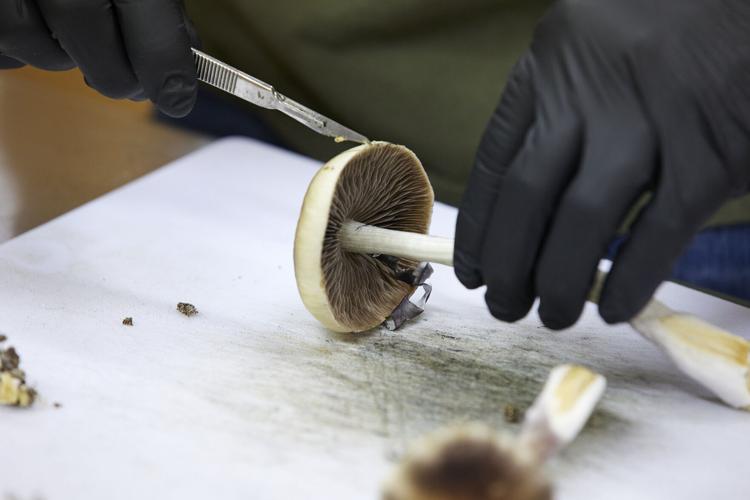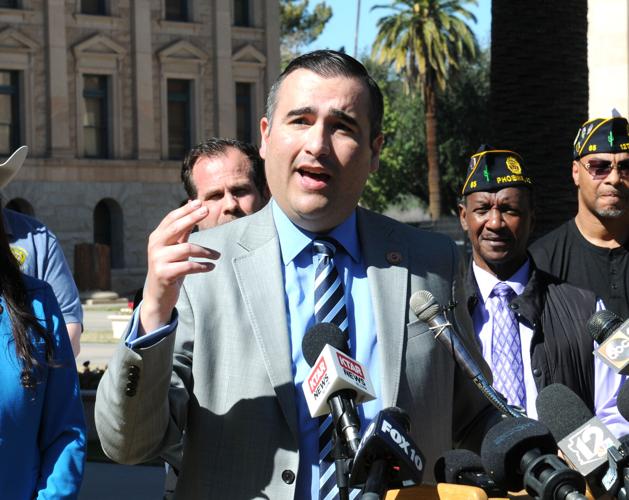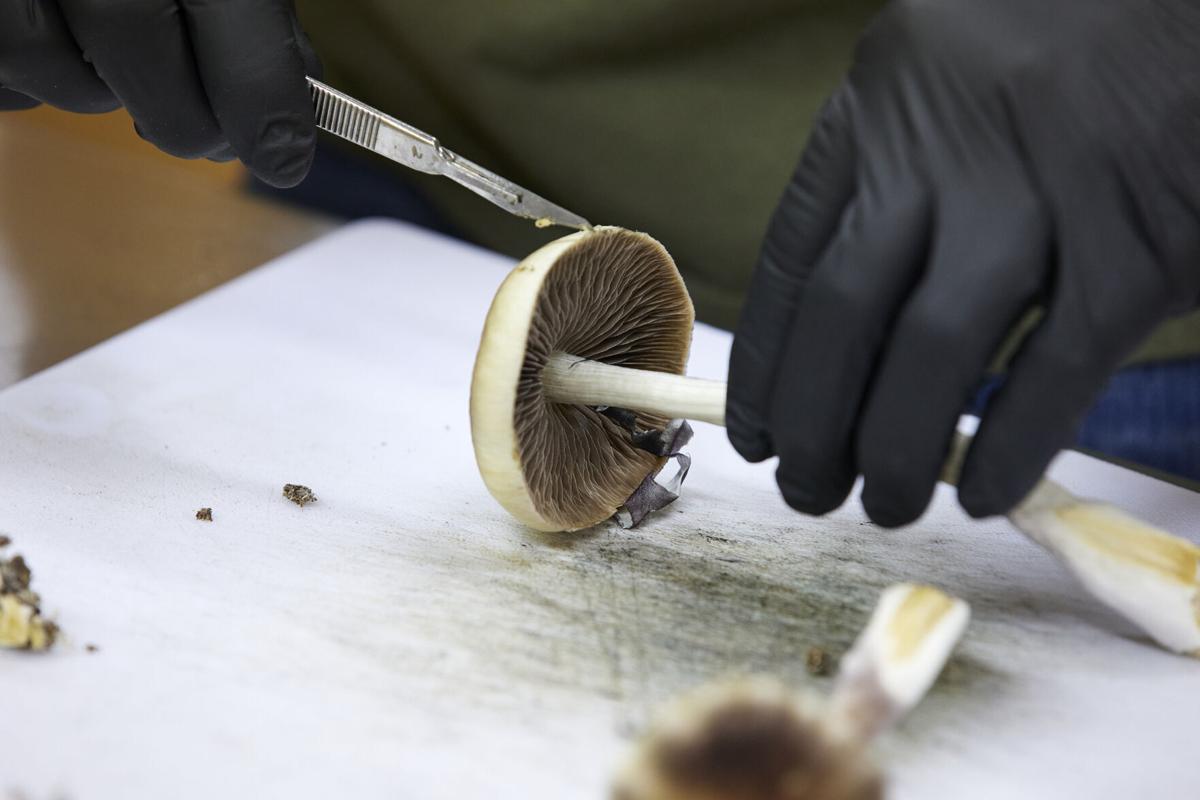PHOENIX — Lawmakers took the first steps Tuesday to legalize the use of psychedelic mushrooms in Arizona under controlled circumstances.
The unanimous vote by the Senate Committee on Health and Human Services comes 14 years after Arizona voters approved the use of marijuana for medical purposes, and four years after that drug was legalized for recreational purposes.
Sen. T.J. Shope, a Coolidge Republican, said his Senate Bill 1570 is not legalization. He said it is a way of providing treatment in a clinical setting for those struggling with conditions such as post-traumatic stress disorder and other mental health issues.
That was also the way the 2010 initiative to legalize doctors’ authority to recommend marijuana to patients suffering from a host of conditions, ranging from cancer and glaucoma to seizures and chronic severe pain. PTSD was added years later.
“If you recall, when medical marijuana was passed … you could go ahead and present at a facility, at a shop, and go off site someplace,” Shope said. “So this is going to be very tightly controlled, and in a controlled setting.”
“It’s not total legalization,” said Joshua Mozell, an attorney and president of the Psychedelic Association of Arizona, which drafted the measure.
“It’s not decriminalization,” he said. “We’re not allowing micro-dosing all over town. Kids are not going to have access.”
He said it would allow patients to get psilocybin only at a state-licensed assisted therapy center, which would have to be operated by a licensed medical provider — a medical doctor, a nurse practitioner, a physician’s assistant or a naturopath.
‘I was a different person’
The vote followed testimony by several individuals who spoke of their own experiences with psilocybin and how it helped them.
One was Bob Parsons, the founder of GoDaddy, which hosts websites and PXG golf clubs. He told lawmakers about his time in Vietnam.
“I came back, I had a flash temper,” Parsons said. “I suffered from depression. And no matter where I was I never felt that I belonged, or that I wanted to belong.”
That all changed after he obtained psilocybin-assisted therapy, he said: “I was a different person.”
Shope said he has heard similar stories, including from someone who served multiple tours in Iraq and was in special operations forces.
In that case, he said, the person “had tried other things that were just not working,” including various prescription drugs.
“Unfortunately (he) had to leave his home and go elsewhere to a foreign country to get this type of treatment,” Shope said.

Sen. T.J. Shope explains Tuesday the details of his legislation to allow psilocybin to be used in Arizona to help treat PTSD and other mental health issues.
Under Shope’s measure, he said, someone in that condition would be able to get treatment in Arizona “and have something that is potentially life-altering in a positive way, in a sense brings back the life that existed prior to those experiences.”
That also was the testimony of Robert Steele, who said he spent 6 1/2 years in the Marine Corps.
He said the Veterans Administration had prescribed him more than 300 pills a month, to the point where it affected his pancreas.
Steele said he had to go to other states and countries to get the psilocybin-assisted therapy he needed. He said it should be available to others.
“It’s time we have an alternative for treatment,” Steele said.
“It might not work for everybody,” he said. “But another option is all we’re requesting here.”
Suicide data cited
Mozell cited data he said supports having the additional option.
He said doctors have suicide rates twice the national average.
Among first responders in Arizona, Mozell said the suicide rate is 40% higher than for others in the state. And the figure for veterans is more than twice the state rate.
“So the people that we ask to go off to war for us, save our lives in the emergency room, run into buildings, they are the ones who are suffering most,” he said.
While psilocybin is still a controlled substance under federal law, Dr. Sue Sisley said she has a federal license to grow organic mushrooms in Arizona for clinical trials. She said what licensed providers need can come from her.
This isn’t the state’s first foray down that path. Lawmakers last year approved $5 million for clinical research on psychedelic mushrooms.
But that money has not yet been spent. And now Democratic Gov. Katie Hobbs is proposing to take back those dollars from the Arizona Department of Health Services.
“We are facing a budget deficit of nearly $1 billion,” said Hobbs’ press aide Christian Slater. “While we work through that shortfall, we are examining spending flexibilities.”
Rep. Kevin Payne, R-Peoria, who secured the $5 million appropriation in 2023, has introduced legislation to keep that money available.
His House Bill 2105 was approved last month by the House Committee on Military Affairs and Public Safety. But it has yet to get a required hearing in the House Appropriations Committee.
MDMA legislation, too
It’s not just psilocybin that has captured the attention of lawmakers this year. There also is a push to allow another drug, MDMA, to be prescribed for use in controlled settings.
Studies have shown that MDMA, commonly known as a party drug called Ecstasy, can help people in PTSD therapy. Last year, the GOP-controlled Legislature passed and Hobbs signed a bill allowing MDMA to be prescribed in Arizona if it receives U.S. Food and Drug Administration approval.
Now a company that has submitted its MDMA drug capsules to the FDA for approval wants the Arizona Legislature to require workers’ compensation policies to cover the drug for police and firefighters who suffer from PTSD.
At a Senate committee hearing Monday, a lobbyist representing drug-maker Lykos Therapeutics, Mike Williams, said FDA approval could be months away and requiring insurance companies to provide treatment is needed. It would become the first approved MDMA-assisted therapy and the first to use a psychedelic drug, according to Lykos.
Currently workers’ compensation pays for visits to mental health therapists for police and firefighters suffering from PTSD. The proposal law, SB 1677, and a companion House measure, HB 2274, would require MDMA treatment to be covered during those visits if it is prescribed.
Typically, it may only be used a handful of times during “talk therapy.” Williams told lawmakers the drug has been shown to lower inhibitions during those sessions.
Workers’ comp opposition
Three lobbyists representing insurers who provide workers’ compensation policies for fire and police agencies in Arizona testified against the proposal, saying that mandating coverage is premature. They urged changes to address their concerns, including ensuring that appropriate medical professionals are diagnosing PTSD and prescribing medications for treatment.
“If this treatment comes out, (and) it works, it will be widely adopted in the workers’ compensation system,” said Marc Osborn, who lobbies for workers’ comp insurer 7710 Insurance Companies. “But we just don’t know.”
It isn’t known what restrictions the FDA may place on the drug and its availability and costs are unknown, he said, especially with only Lykos supplying the drug.
Osborn also noted the proposed law would bypass the normal evidence-based system overseen by the Industrial Commission of Arizona that ensures an injured worker gets the most up-to-date treatment. Osborn also pointed out that pain management using opioids was favored in the early 2000s and that turned out to be a disaster.
“So I say, take it slow, be careful,” Osborn said.
But Williams said worrying about nuances and availability misses the point.
“While they’re debating whether this is the right modality or that’s the right modality and then they want to go to an independent review, I’m just hoping that the firefighter doesn’t get so depressed that he or the police officer commits suicide and leave their family,” Williams said.
The Senate Finance and Commerce Committee advanced the measure on a 4-2 vote.
“At the end of the day, it’s about saving lives hopefully, saving our first responders’ lives who are out there protecting us each and every day,” said bill sponsor Sen. David Gowan, R-Sierra Vista.
Sen. J.D. Mesnard, R-Chandler, was one of two Republicans who voted against the bill, saying it is possible it could be amended to allay his concerns.
“I think we all agree we want the best treatment for our first responders.” Mesnard said. “This may be it — I don’t know. But I am just uncomfortable making that decision right now rather than letting the normal process play out.”






